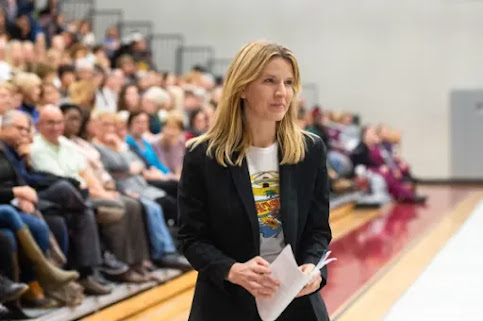The author of the memoir : '' EDUCATED, '' one of the Book Review's 10 Best Books of 2018, reads herself to sleep when she can : But from time to time a book takes hold ..... and I end up reading through the night.''
.- What books are on your night stand?
Hilary Mantel's ''Giving Up the Ghost'' and Judith L. Herman's ''Truth and Repair.'' Judith Herman because she is one of the best experts writing on the topic of harm and healing - how we confront the past in order to leave it behind.
Hilary Mantel because she passed away last year, and I can't stop thinking about what a loss that was to literature. Years ago, I used to say Toni Morrison was my favorite living writer. When Morrison passed, I said Hilary Mantel. Now I don't know what to say.
.- What's the last great book you read?
I just read '' Some People Need Killing, '' by Patricia Evangelista. It's not out yet but it will be in October. The book is a journalistic and personal account of the killings that took place in the Philippines under President Rodrigo Duterte.
An unthinkably brave book to have written. Compelling and important.
.- Are there any classic novels that you only recently read for the first time?
I don't know how to define classic, but recently, I read Muriel Spark's '' Memento Mori '' [ a Latin phrase meaning : Remember you must die ], which felt classic to me.
A bizarre and dark little fable about aging and mortality - about economic abundance and emotional poverty. I laughed out loud all the way through.
.- Describe your ideal reading experience [when. where, what, how].
I like to read before I go to sleep. My thinking is that reading will focus my mind, bring a hush over the chaos of the day so I can drift off. But from time to time a book takes hold in that peculiar way that a book can, and I end up reading through the night, until the last page.
Then I'm up after that thinking about the ending. Books are both the best and worst thing for my sleep.
.- Has a book ever brought you closer to another person, or come between you?
Many of my friendships have been nourished by books. One of my best friends grew up in a religious home, as I did, and has struggled to settle into a comfortable relationship with her spiritual inheritance.
A few years ago, we two traveled through Mexico together, and as we moved from place to place we both read Elaine Pagels's memoir '' Why Religion? '' The book is desperately sad and philosophically daring.
It is a book about beliefs, and how beliefs can be meaningful and comforting and inspiring, and also costly. The trip was wonderful, like a pilgrimage. We sat up late most nights, nursing margaritas and trading quotes and stories and a few tears.
I am so grateful to that book, both for the wisdom in it and also for getting me that friendship.
.- What moves you most in a work of literature?
I like to be surprised by the characters - the discovery that the angel is not so angelic, the devil not so depraved.
Being surprised by people is one of the great pleasures and great pains of life.
.- Do books serve a moral function, in your view? How so?
I suppose I believe they do : When readers live a life on the page that isn't their own, their mind is changed. Stretched maybe.
But I hesitate to say we should read books in order to be ''good.'' We should read books because they have captured us in some way, have taken hold.
If you're merely trudging through a story, it can do nothing for you. Nothing done from a dead place brings life.
.- What do you plan to read next?
I recently heard Safiya Sinclair recite poetry at a small gathering. The words were delicious, textured and lush, the emotions powerful.
I was excited to learn that she has a memoir coming out this October, about her strict Rastfari upbringing in Jamaica and her decision to forge a new life for herself.
The book also has an excellent title : '' How to Say Babylon.'' I've read a few pages and I'm hooked. The writing is downright nutritious.
The World Students Society thanks The New York Times.

.png)


0 comments:
Post a Comment
Grace A Comment!